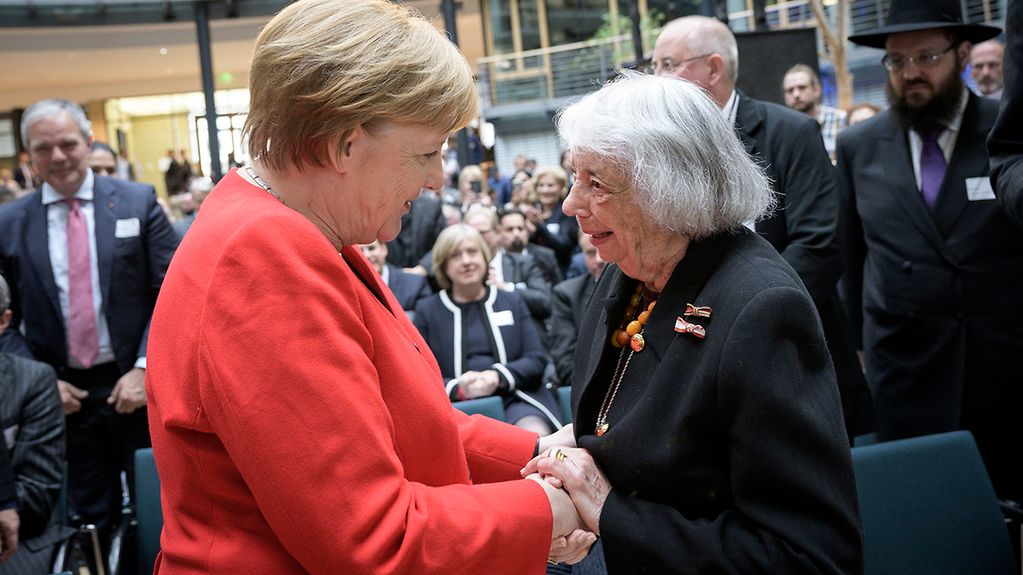70th anniversary of the German Basic Law - Deutschlandstiftung Integration
Margot Friedländer, 97-year-old Holocaust eye witness is the first person to be awarded the new "Talisman" award by the Deutschlandstiftung Integration (DSI). Patron Angela Merkel thanked her for her readiness to tell her story after all she has suffered, and pointed to the values laid out in the German Basic Law or constitution.
2 min reading time

Chancellor Angela Merkel congratulates the Holocaust survivor Margot Friedländer on the "Talisman" award
Photo: Bundesregierung/Bergmann
We can only forge a good future "if we know the past and if we accept responsibility for the past". With these words, Chancellor Angela Merkel thanked the Holocaust survivor Margot Friedländer, an eye witness of this period of history. The 97-year-old was presented with a special award by the Deutschlandstiftung Integration – the first "Talisman". This is a new distinction, awarded by the foundation in recognition of services to fostering social cohesion.
Prize-winner Margot Friedländer represents Article 1 of the Basic Law, "Human dignity shall be inviolable", in the DSI campaign "Mein Deutschland. Ich lebe hier auf gutem Grund". The foundation awards the distinction to people whose life or special dedication have fostered cohesion within society.
The freedom that every human being needs
Since the Deutschlandstiftung Integration was founded in 2008, the Chancellor has acted as patron. In her address to mark the 70th anniversary of the Basic Law, she praised the constitution. It gives everybody in the country the chance to live their life as they want to, she said. "The Basic Law gives us the freedom every human being needs," declared Angela Merkel. This includes people with and without a migrant background living together. A total of 19.3 million people with a migrant background live in Germany.
Equal opportunities for all
"Over the decades, immigration and integration policy has changed our country to a great extent. Integration has only slowly moved to the centre stage of politics," said the Chancellor. It was a difficult learning process and means a policy of equal opportunities, especially in education.
The values and the rights laid out in the German Basic Law bring together everybody in Germany on an equal basis, young and old, in towns and cities and in the countryside. "We share the responsibility to defend the values laid out in the Basic Law." This is particularly true when we face hatred, violence, extremism or anti-Semitism. It is not unusual today for the limits to freedom of expression to be "pushed to breaking point to test them", said Angela Merkel. But "human dignity is non-negotiable".
A reason to celebrate
The 70th anniversary of the German Basic Law is "a reason to celebrate". Over this period we have managed again and again to fill the values and the rights laid out in the German Basic Law with life. "It gives me great pleasure, as Chancellor of all the people in this country, to help ensure that everybody who lives here can participate in the amazing opportunities our country offers on an equal basis."
As the name of the foundation "Deutschlandstiftung Integration" (German foundation for integration) illustrates, the foundation aims to support integration in Germany. The foundation actively supports the integration process with its programmes, such as the grant and mentoring programme "Geh Deinen Weg" launched in 2012, which supports talented young people with a migrant background on their way into the working world. The programme provides inspiring beacons and role models.